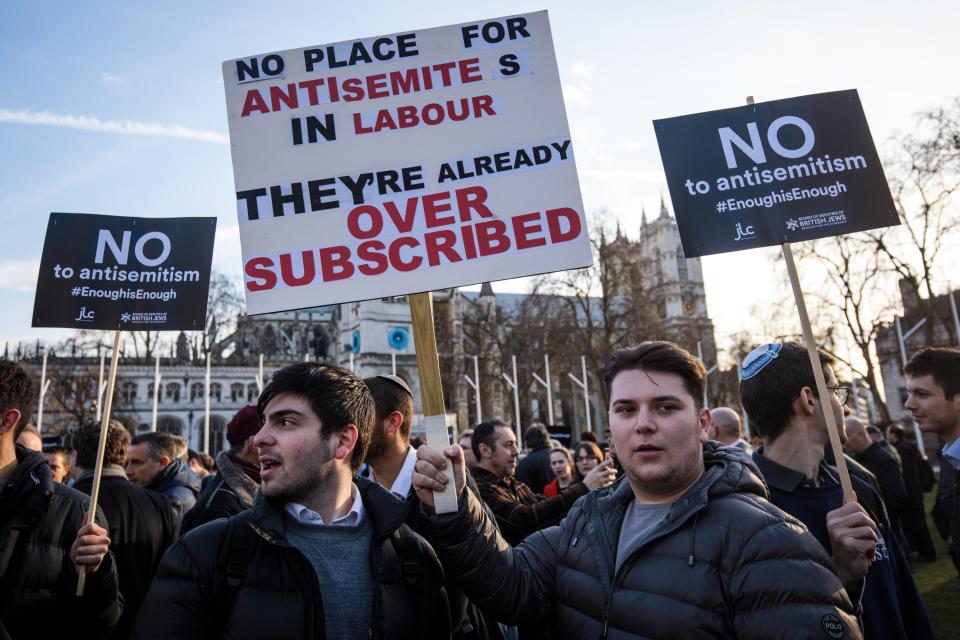Shocking poll finds 40% of British Jews would 'seriously consider' leaving the country if Jeremy Corbyn was PM

The anti-Semitism crisis in Labour has hit the party hard and a new poll shows the full extent of how it has damaged Jeremy Corbyn.
According to the Survation poll for the Jewish Chronicle (JC), nearly 40% of British Jews would ‘seriously consider emigrating’ if the Labour leader became Prime Minister.
Despite voting to adopt the full IHRA definition of anti-Semitism this week, a summer of headlines that labelled Labour and Mr Corbyn anti-Semitic has seemingly done lasting damage.
The poll found that British Jews aged between 35 and 54 are most concerned about the prospect of a Labour government under Mr Corbyn, while 44% of Jewish women say they would emigrate if he won power.
Just over half (51.77%) said they would not consider leaving, while nearly 10% said they did not know.

Jonathan Goldstein, chair of the Jewish Leadership Council, told the JC: ‘As someone who has always been a proud British Jew, it saddens me that almost 40% of our community would consider emigrating if Jeremy Corbyn became Prime Minister. This is deeply worrying.’
He added: ‘If members of our community would even consider leaving Britain because they feel threatened by the prospect of our potential next Prime Minister, this should worry everyone.’
Following Labour’s decision to incorporate the International Holocaust Remembrance Alliance’s (IHRA) definition of anti-Semitism into the party’s code of conduct, a senior member of the shadow cabinet urged Jewish critics to ‘come back into the room’ and engage with the party over its approach to anti-Semitism.
READ MORE ON YAHOO NEWS UK:
BBC presenter Rachael Bland dies at 40 after cancer battle
Two Salisbury Novichock attack suspects are Russian spies, Theresa May says
Man, 66, has his wallet stolen as he’s dying from heart attack
Donald Trump hits out at ‘fraud’ tell-all book written by Watergate reporter
Japan typhoon: At least 11 dead and 600 injured after worst storm in 25 years
But Jewish groups hit out after the move was accompanied by a statement that said the party will ensure the changes do ‘not in any way undermine freedom of expression’ on Israel or the rights of Palestinians.
Mr Corbyn was attacked for his unsuccessful call for the NEC to accept a clarification that said it should not be considered anti-Semitic to describe Israel as racist.
Lady Chakrabarti, who conducted an inquiry into anti-Semitism for Mr Corbyn, insisted that the NEC’s additional statement did not dilute its commitment to fighting the problem.

The shadow attorney general told BBC Radio 4’s Today programme: ‘There was no sullying. The words were not a caveat, were not a dilution; the words are true, which is that accepting these examples, in my view, in no way negates reasonable free speech around these difficult issues around Israel and Palestine.’
But Labour backbencher Dame Margaret Hodge, who accused Mr Corbyn of being a racist, said her leader had sought a ‘get-out clause’ from the IHRA definition, telling Today: ‘It demonstrates to me a reluctance on his part, rather than a very public and intense acceptance of the need to deal with the issue.
‘I would love it if he proved me wrong, but we have to see both in his actions and in the way he consults and engages with the Jewish community over the coming period whether or not we are on the right road back to rebuilding trust.’


